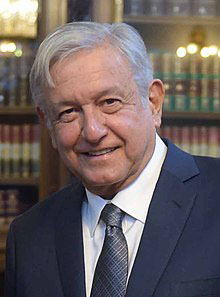 MONTERREY, Mexico – This country is breathing a collective sigh of relief following President Trump’s decision to temporarily suspend his threat to impose draconian tariffs on Mexican goods. But don’t kid yourself, the truce is not likely to last long.
MONTERREY, Mexico – This country is breathing a collective sigh of relief following President Trump’s decision to temporarily suspend his threat to impose draconian tariffs on Mexican goods. But don’t kid yourself, the truce is not likely to last long.
Mexican President Andres Manuel Lopez Obrador’s self-imposed international isolation has left this country in a weak diplomatic position to defend itself from Trump’s tantrums. That is likely to embolden the U.S. president to further step up his attacks on Mexico as he begins his 2020 re-election campaign.
Granted, Trump’s threat to impose tariffs of up to 25 percent of Mexican goods is one of the dumbest and most counter-productive U.S. ideas ever to fight illegal migration.
It would kill hundreds of thousands of jobs on both sides of the border, raise the price of cars and electronic goods for U.S. consumers, drive up unemployment in Mexico, and increase illegal migration to the United States.
It’s not too hard to understand why Trump is doing this. Mexico-bashing has been the pillar of his 2016 presidential campaign, and it’s shaping up as the pillar of his 2020 re-election campaign.
All populist leaders need an enemy – real or fabricated – to energize their base, and Trump is no exception.
What’s harder to understand is Lopez Obrador’s inward-looking defence strategy. Instead of trying to forge alliances with Europe, China and other victims of Trump’s outdated economic nationalism, Lopez Obrador has isolated Mexico from the world’s diplomatic community.
When Lopez Obrador was elected in 2018, Trump had been in power for more than a year, and it was no secret that Mexico would continue be his favourite villain.
Yet in the six months since he took office, Lopez Obrador – who doesn’t speak any foreign language and has never shown much interest in international affairs – has not made one single trip abroad. Nor did he visit other countries during the six months prior to his inauguration.
By comparison, virtually all of his predecessors in modern times have visited several key countries before and after they took office.
What’s worse Lopez Obrador said last week that he will not attend the June 28 meeting of the G-20 in Osaka, Japan. That summit of the world’s biggest economies will be attended by Trump and the presidents of China, Russia and key European countries.
Most leaders of emerging countries would love to sit at the G-20 table, to be able to press for their countries’ interests in formal and informal meetings.
Neither is Lopez Obrador planning to attend the meeting of the World Trade Organization General Council to be held June 23 in Geneva, Switzerland.
Just as bad, Lopez Obrador has effectively pulled Mexico out of key regional and international groups. He has proclaimed that his government will be “neutral” on issues such as Venezuela, and that he will follow a policy of “non-intervention” in other countries’ internal affairs.
Until Lopez Obrador’s inauguration, Mexico was one of the most active members of the Group of Lima, a regional group of Latin America’s biggest democracies – including Brazil, Argentina, and Colombia – that is seeking a restoration of democracy in Venezuela.
But since Lopez Obrador took office, Mexico has stopped attending most Group of Lima meetings. Likewise, it is not participating in the he so called International Contact Group, a group of mostly European countries – including Spain, Germany and Britain – that are seeking a negotiated solution to Venezuela’s tragedy.
In other words, Lopez Obrador has pulled Mexico out of the most important groups that are dealing with Latin America’s biggest humanitarian crisis in recent memory. And if you are not a player, you are not in the game.
For the good of Mexico, and that of the United States, Lopez Obrador should get his country back to the international arena, start attending key international summits, team up with Republican and Democratic U.S. leaders, and jointly send a clear message to Trump that you can’t stop illegal migration by making people poorer.
On the contrary, the Mexican president should be preaching across the world that what the United States and Mexico need is more – not less – trade and economic integration, because a rising tide lifts all boats.










